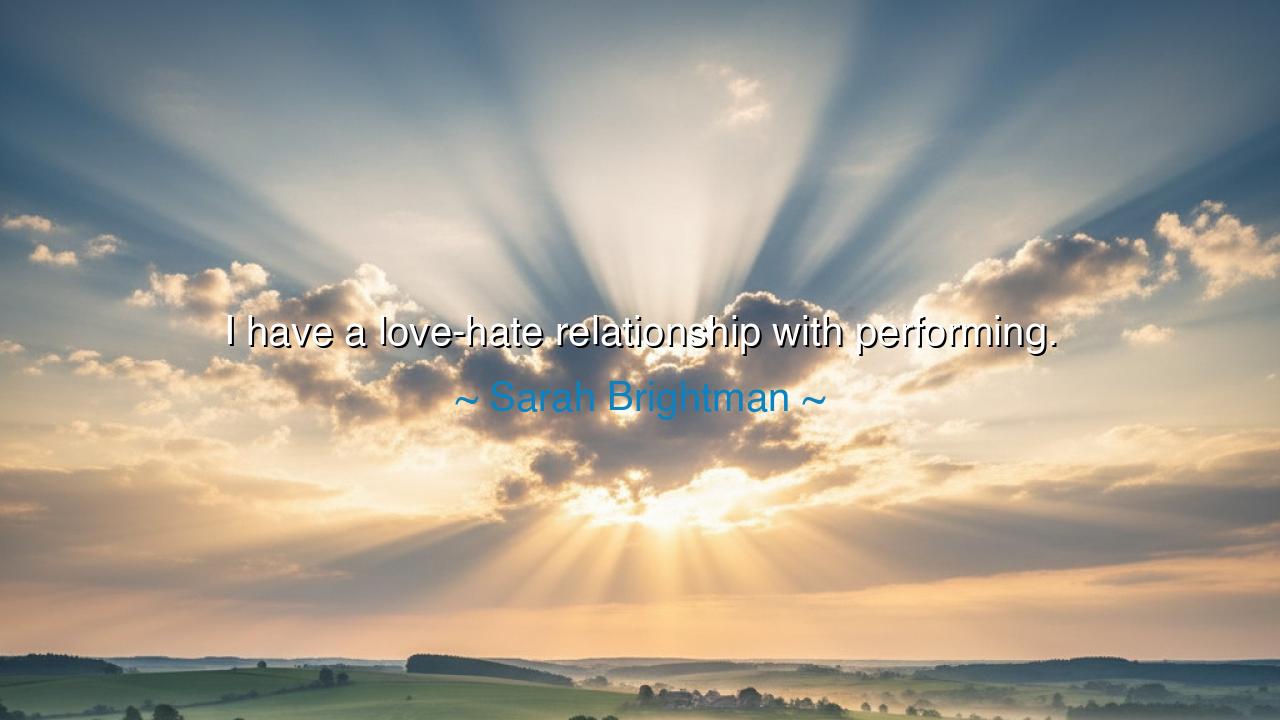
I have a love-hate relationship with performing.






In the utterance of the gifted songstress Sarah Brightman, the phrase, “I have a love-hate relationship with performing,” reveals a timeless struggle within the soul of the artist. To perform is to open one’s spirit to the gaze of the multitudes, to be both exalted and laid bare. It is a divine offering of music and emotion, yet it also brings the weight of expectation, exhaustion, and vulnerability. This duality, much like the dance between light and shadow, forms the essence of her conflict.
The origin of such words lies in the ancient truth that the path of the artist is never one of pure joy. The love arises from the ecstasy of creation and the unity felt with the audience when hearts beat together in a single rhythm. The hate emerges from the endless rehearsals, the pressure of perfection, and the toll upon the body and spirit. Even the greatest bards and minstrels of old knew this paradox, for they too sang beneath the stars while carrying the burden of mortal fatigue.
When Sarah speaks of this bond, she acknowledges that performing is not merely a craft, but a living force—one that can inspire and consume. It is like the sea: serene and beautiful at dawn, yet capable of roaring storms by night. She loves it because through it she touches eternity, but she hates it because it demands sacrifice, taking pieces of her being with every note sung.
Thus, her words serve as a lesson to those who would follow in her footsteps. To perform is to enter into a sacred covenant with the world, one that brings both glory and sorrow. The wise performer does not seek to destroy the hate or magnify the love but learns to walk the narrow path between them, accepting both as necessary truths. In this balance lies the heart of all enduring art.






DVHoang Ngoc Diep Vo
Sarah Brightman’s sentiment resonates with the idea that even the most successful performers can have mixed feelings about their craft. It’s surprising to hear that someone with such an accomplished career might struggle with aspects of performing. What do you think causes this tension? Is it the public nature of the profession, the constant demand for perfection, or perhaps the emotional vulnerability that comes with performing? Could embracing both the love and hate be part of an artist’s growth process?
TTri
Sarah Brightman’s love-hate relationship with performing seems to capture the complex emotions many entertainers face. Being on stage is exhilarating, yet the vulnerabilities that come with it—like fear of failure or fatigue—can be draining. Could this tension between love and hate actually be a driving force behind her performances, pushing her to give more of herself to the audience? Is this duality something that fuels artistic growth, or is it ultimately exhausting?
ATNguyen Anh Thu
It’s interesting that Sarah Brightman expresses this duality towards performing. The love part might come from the passion and joy of creating art, while the hate part could stem from the stress and fear of being judged. I wonder, what aspect of performing does she find most challenging—does the pressure of perfection weigh her down? It makes me curious if most performers experience this internal struggle or if it’s something that develops over time.
CHPhuc Thinh Chau Huu
Sarah Brightman’s comment about having a love-hate relationship with performing is so relatable for many artists. On one hand, there’s the thrill of being on stage and connecting with an audience, but on the other, the pressure and vulnerability can be overwhelming. Do you think it’s common for performers to feel conflicted about their craft, or is this something unique to Sarah's experience? How does the intensity of public scrutiny affect a performer’s relationship with their work?